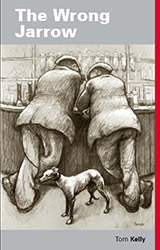The Wrong Jarrow - OUT OF PRINT

Jarrow was once called The Town That Was Murdered. It is still a painful site of popular memory, a shameful emblem of industrial decay and deprivation, immortalised by grainy newsreels, the photographs of Bill Brandt and the speeches of Ellen Wilkinson. Tom Kelly has lived in Jarrow for most of his life, but he sometimes feels as though he is living in the wrong Jarrow, as though the ghosts of the past cannot leave the place.
The Wrong Jarrow brings together poems from Tom Kelly's previous books, Their Lives, The Picture from Here, That Time of Life and John Donne in Jarrow as well as new work. It is a clear-eyed picture of the North East today, where deprivation and unemployment are supposedly a distant memory. It also includes a sequence of poems inspired by the paintings of Norman Cornish, charting the life and times of a working class community, something this collection achieves with passion and honesty.
Sample Poems
the wrong jarrow
For Andy Willoughby
In the wrong Jarrow
there's no cobbled streets
no men hunched round corners
eyeing up the ground
there's no gas lamps and hobnailed boots
singing down Ellison Street
there's no one gathering around the Town Hall with banners
and the Bishop Of Durham
isn't saying it's wrong.
It's the wrong Jarrow
the hunger should be more real
like in some African state
trousers should be shiny, threadbare
there should be more hate
policemen should use truncheons more
let's see more blood
broken bones.
This is the wrong Jarrow
poverty needs to be more visible
this is the wrong Jarrow
there's unemployment and deprivation
and no steel works and shipyard and the club's are dead
and there's problem estates and no go areas
and drugs on tap.
But it's the wrong Jarrow
It's not what I want
not what I want at all.
I'll come back when it's burning.
jarrow slag heap, 1933
from a photograph
Palmer's shipyard closed.
Three years to the Crusade.
Six years to war.
Working on the Slag Heap,
Palmer's off–white
waste mountain
running through it
dark as blood.
Digging, shovelling.
Hard work.
Low pay.
Poor men working on slag.
the blood pit, jarrow
I've got this photograph blu–tacked on my wall,
five men staring at the camera,
knowing precisely who they are.
It's late in the 1930s; they are at the Blood Pit,
two or three of them are boxers
they've got that look:
hit me, I'll smash you back.
There's one in the middle
that smiles, he must be a manager
of sorts, he has his arms round the others.
No sign of any blood.


